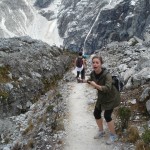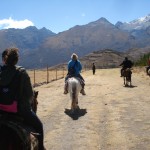One of the best things about studying abroad is the opportunity to travel. When you’re staying in hostels and paying guides, it’s much cheaper to travel in a group. So, some gringo friends and I decided to go to Huaraz. Huaraz, being situated right between the Cordillera Blanca (white mountain range, named for its snowy peaks) and the Cordillera Negra (black mountain range, comparatively lower altitude, less snow), has become a mecca for hikers. Breathtaking mountain trails, and lots of hostels to choose from. Jo’s place is a good one: cheap lodging, though it has hard beds, also the option of just camping in the yard, which I assume costs less? Hiking info available, and plenty of space to hang laundry to dry. We found a nice restaurant, too, café andino. They have a library/book exchange. They serve pancakes all day. Good coffee, but what you really have to try is the shara shara herbal tea and the local beer.
Our first day we decided to go horseback riding into the mountains. I can’t remember the name of our destination, but we began our quest at a place called Cochapampa. We met our guides and saddled up. It took me a little while to get used to the rocking motion of the horse, but soon I felt at ease in the saddle. As we climbed the mountain, we gazed down in the valley we had come from. The horses were amazing: stepping from rock to rock, they knew the path as well as our guides. My horse, Gringo, was a real trooper, and only needed occasional encouragement. We passed two lagoons of grayish blue. The air was dry compared to Lima, and the best thing was the sun. Lima is nearly always gray in the winter, always cold, always damp. The sun was so nice, my face burned to a cheery pink.
Huaraz is at a high altitude. My advice is to take it easy on your first day there. Drink lots of water, don’t eat too much, eat things that are easy to digest. Wear lots of sunscreen. Walk around town a bit, maybe check out a musem. We thought that horseback riding up a mountain would be taking it easy. It wasn’t. The ride was amazing, but our headaches got progressively worse. When we got back to the hostel, I slept from about 4pm until the next morning, and then I felt better. Coca leaves are a godsend.
On Sunday, when we were better adjusted to the altitude, we decided to go hiking to Laguna 69. From the entrance to the park, we walked through the valley, then zigzagged up a mountain path, across a plain, and up another zigzag path, taking frequent brakes to catch our breath in the thin air. Exhausted, we finally reached a rocky place where the path became level, and saw a patch of the brightest blue. Laguna 69. We were hungry, tired, and thirsty, but the blue made it all worth it. Never has a simple sandwich tasted so good. With juice, and some hard candies, and an apple, sitting on a rock next to the lagoon, it was glorious.
One of the nights we were there, we were walking home from supper and heard a drum beat. We stopped to listen. As the sound neared, we were able to distinguish horns and woodwinds, a whole marching band, followed by ranks of children. They marched with paper-mache fish, lanterns, as well as huge figures made of paper suspended by sticks, each carried by 3 or 4 children. Figures of dragons, clowns, dogs, cats, the Smurfs, the Simpsons (American influence everywhere), the Grim Reaper. It must have been a half-hour we stood as the kids marched by, hundreds of them, all shouting cadences, smiling laughing. I wish I had that kind of school spirit. It was the yearly anniversary of one of the largest schools in Huaraz.
Huaraz is a great hiking place for it natural beauty. But I felt very much like a tourist, which I usually don’t as a student in Lima. As we drove by little Andean towns in our hired van, off to go hiking, I wondered how the towns had been affected by tourism, what blessings and curses it had brought, and how I was impacting them. On one hand, tourism can be a monetary force to preserve the land, protect natural parks from pollution by mining industries and such (this has often happened, look up a company named Barrick). On the other hand, it could create divisions. A relatively privileged, dollar-based tourism economy in the middle of an otherwise agrarian society. Who knows? I must say I enjoyed our trip though.
Peace,
Ian
- tree
- “ahí cerquita no más.” The concepts of time and distance in the Andes have traditionally been different than western clock time. People need to live spread out to find arable land and take advantage of different microclimates…which means the neighbors might be at a distance of several days’ walk. So we kept joking that the laguna was “right there” “just a little ways away.” It was another hour from here
- A little cranny along the way
- The beginning of our quest to Laguna 69
- Laguna…Quechua names are hard for me to remember
- Landscape changes. We went from open, sloping grassy areas to rocky mountainside forest to lagoon. Probably some other zones in there that I just don’t know how to describe














¡Hola Ian!
¡Qué aventuras tan padres has tenido hasta ahora! Me alegra mucho saber que estás disfrutándolas al máximo. Sigue “blogeando” para seguir leyendo sobre tus recorridos. Los mejores deseos de la profe Dwyer.